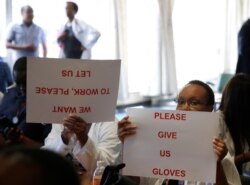Human rights groups in Zimbabwe say the government has frequently violated people’s basic rights since the start of the COVID-19 pandemic. The groups presented their findings at a partially virtual meeting with officials in the capital Thursday.
At the meeting, rights groups presented a report they call "The Impact of COVID-19 on Socio-Economic Rights.” The report chronicles how Zimbabwe’s government has violated human rights since COVID-19 lockdowns started in March 2020.
Calvin Fambirai, executive director of Zimbabwe Association of Doctors for Human Rights, was one of the speakers. He said the COVID-19 pandemic highlighted the gap in medical care between the haves and have-nots in the country.
“The haves were able to secure that equipment and the bedding facilities in private hospitals whose pricing was far beyond the majority of poor Zimbabweans. The right to health is also another component that relates to torture and inhumane and degrading treatment,” said Fambirai.
On a number of occasions, Zimbabwe’s doctors and nurses have gone on strike, demanding adequate protective equipment and decent salaries during the coronavirus pandemic.
Naome Chakanya, a researcher at the Labor and Economic Development Research Institute of Zimbabwe, said the government must increase salaries of all its employees to motivate them.
“If the government is not doing a good service in terms of providing living wages, it is also increasing its own burden in terms of filling the gap of decent work deficit by providing social protection. So, it is in the best interest of the government to ensure that the majority of workers in the public sector enjoy decent work,” said Chakanya.
The government pleaded bankruptcy whenever its workers asked for a review of its salaries. An average civil servant in Zimbabwe earns less than $200 per month. The workers’ salaries increased to at least $500 per month to climb above the poverty line.
Also Thursday, Sibongile Mauye of the Zimbabwe Gender Commission said cases of teenage pregnancies have increased because children are not going to school and are restricted to their homes.
“We are worried about this, and we are working with other partners to ensure there is targeted support for girls who are mostly affected. Because we have seen that a number of girls have been inducted into child prostitution … because of poverty in the urban areas. That is a dent on gender equality, because these girls will never be able to rise to be leaders, even in the public and private space,” said Mauye.
Rights groups in Zimbabwe have previously accused the government of taking advantage of COVID-19 restrictions to stifle citizens' rights.
A number of activists were arrested on charges of flouting lockdown regulations after they protested against the government’s failure to provide for those affected by the lockdowns.
Erick Mukutiri, secretary of the Zimbabwe Human Rights Commission, said his organization was aware of the complaints raised by rights groups during the lockdown.
“I must say from our point of view as a commission, based on the assessment that we also carried out, as well as the feedback we have been receiving from our stakeholders, including complaints on human rights violations that we received, I can confirm that the findings (in the report) are credible,” he said.
Mukutiri promised no action Thursday, saying the commission is monitoring the situation.
Zimbabwe has 38,191 confirmed coronavirus infections and 1,565 deaths, according to Johns Hopkins University, which tracks the global outbreak.





